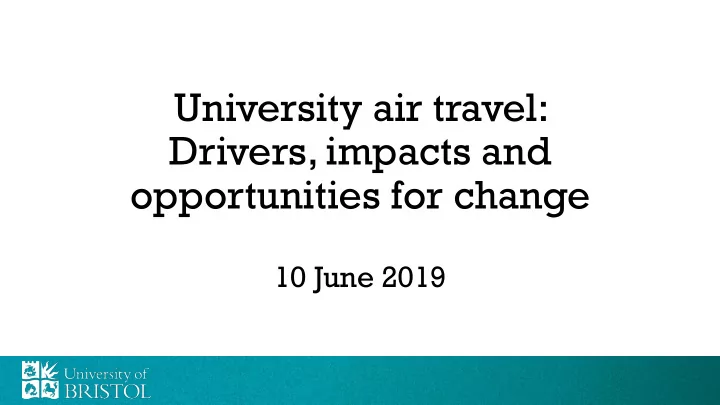

University air travel: Drivers, impacts and opportunities for change 10 June 2019
Opening remarks Dr Erik Lithander Pro Vice-Chancellor (Global Engagement)
Workshop aims and agenda Martin Wiles Head of Sustainability
Aims of the workshop • Help inform development of new business / academic travel plan for the University • Learn more about current business / academic air travel patterns and the potential for change • Share ideas on practical measures the University could take to reduce reliance on air travel
Agenda 1110-1120 – Introduction • Dr Erik Lithander – Pro-Vice Chancellor for Global Engagement • Martin Wiles – Head of Sustainability 1120-1140 - University air travel: what do we know? • James Ryle – Sustainability Manager (Transport, Special Projects) 1140-1250 – Roundtable discussions • Constraints and opportunities for reducing air travel • What can the University do to reduce reliance on air travel for business and academic trips 1250-1300 – Summary, next steps and close
University air travel: what do we know? James Ryle Sustainability Manager (Transport, Special Projects)
Data sources for air travel analysis • Greenhouse gas emissions inventory (ISO14064) • Expenses and purchasing card data • Ian Allan Travel annual CO 2 reporting • Staff travel survey • Interviews with 25 staff (workshop profiles only)
Scope of air travel analysis • All work-related travel undertaken by staff and postgraduate students where paid for by University • Includes travel funded by external bodies where booked by the University • Includes travel by visiting academics where funded and booked by the University • Excludes staff/PG travel where funded and booked by external bodies • Does not extend to other student study-related travel or international student mobility
Business travel spend, miles and emissions by mode (2017/18) Rail Rail Road Rail 2% 8% Road 6% 21% 5% Air Air Air 92% 64% 87% Road 15% Emissions Expenditure Mileage Total: 10,443 tCO2e Total: £5.1m Total: 38.2 million
Business travel spend by faculty (2017/18) 600,000 500,000 400,000 Expenditure (£) 300,000 200,000 100,000 Note: • Excludes staff travel 0 expenses and coach/bus Arts Biomedical Engineering Health Science Social Professional contract hire Sciences Sciences Sciences and Services • Data available pre-ERP Law only i.e. Aug 17 – Apr 18 Air Taxi Car hire Rail
More than half of all air travel funded by academic research grants % of all air travel expenditure by funding source Core Research 44% 56% Note: • Excludes staff travel expenses • Data covers Aug 17 – Apr 18 only
Air travel emissions have doubled since 2010 12,000 10,000 8,000 Ferry tCO2e 6,000 Rail Road 4,000 Air (domestic) Air (short haul) 2,000 Air (long haul) 0 2010/11 2011/12 2012/13 2013/14 2014/15 2015/16 2016/17 2017/18 Transport-related emissions (tCO2)
Scopes used for carbon emissions reporting Emissions included in University’s carbon neutral target Image credit: University of Edinburgh Climate Strategy 2016-26
Air travel accounts for 19% of total (known) operational carbon emissions Other Scope 3 6% Air travel 19% Scope 1&2 Air travel Scope 1&2 Other Scope 3 75% Air travel share of total emissions, 2017/18
Per capita emissions from air travel rising against background trend of emissions cuts 1.6 1.4 tCO2e per FTE (staff and students) 1.2 Air travel emissions per 1.0 capita 0.8 Scope 1 & 2 0.6 emissions per capita 0.4 0.2 0.0 2010/11 2011/12 2012/13 2013/14 2014/15 2015/16 2016/17 2017/18 Trends in emissions per capita
Increases in air travel emissions have all but cancelled out reductions in other areas 50,000 -5,739 tCO2e 40,000 Scope 1&2 30,000 Air travel 20,000 10,000 +5,321 tCO2e 0 2010/11 2017/18 CO 2 emissions: Scope 1 & 2 vs air travel
Reasons for business travel (all modes) Conference / sharing research 49% Research / industry collaboration 32% Operational / admin meeting 26% Fieldwork / site visit 19% Training event 15% Notes: Trade show / hospitality event 6% • Based on 54% of respondents to 2018 staff travel survey (n=3,184) who ever undertake business travel as part of their job Recruitment 4% • Q: Why did you undertake business travel in the last month? • % of yes responses by reason (multi-answer)
Findings from interviews • Internationalisation driving growth in engagement with new markets and partners across the world • High premium on physical presence for building interpersonal relationships and developing new opportunities • Time and cost constraints are key in determining choice of air over rail for domestic and European journeys • Choice of virtual conferencing frequently frustrated by availability or reliability of technology • High levels of awareness and concern over environmental and human impacts of air travel • Self-regulation prevalent on grounds of cost, time and climate impacts while policy and culture tend to make flying the obvious choice
Discussion 1 • 10 typical University travel scenarios (two per table) • Q1: Why might flying be the first choice? (10 mins) • Q2: Under what circumstances could a different choice be made (10 mins) • Consider: • Type of engagement • Cost, time, technology constraints • Policy, cultural, human factors • Feedback (1 min per scenario)
Discussion 2 • Q: What measures can the University take to reduce its reliance on flying for academic and business travel? • Individual idea generation (5mins) • Roundtable discussions to sift, categorise (15 mins) • Feedback (2 mins per table)
Next steps • Interim review of Travel, Subsistence and Expenses policy • Tender for travel management contract starting April 2020 • Conclusion of green fleet review • Development of new business travel policy • Further review of TSE and related policies
Recommend
More recommend